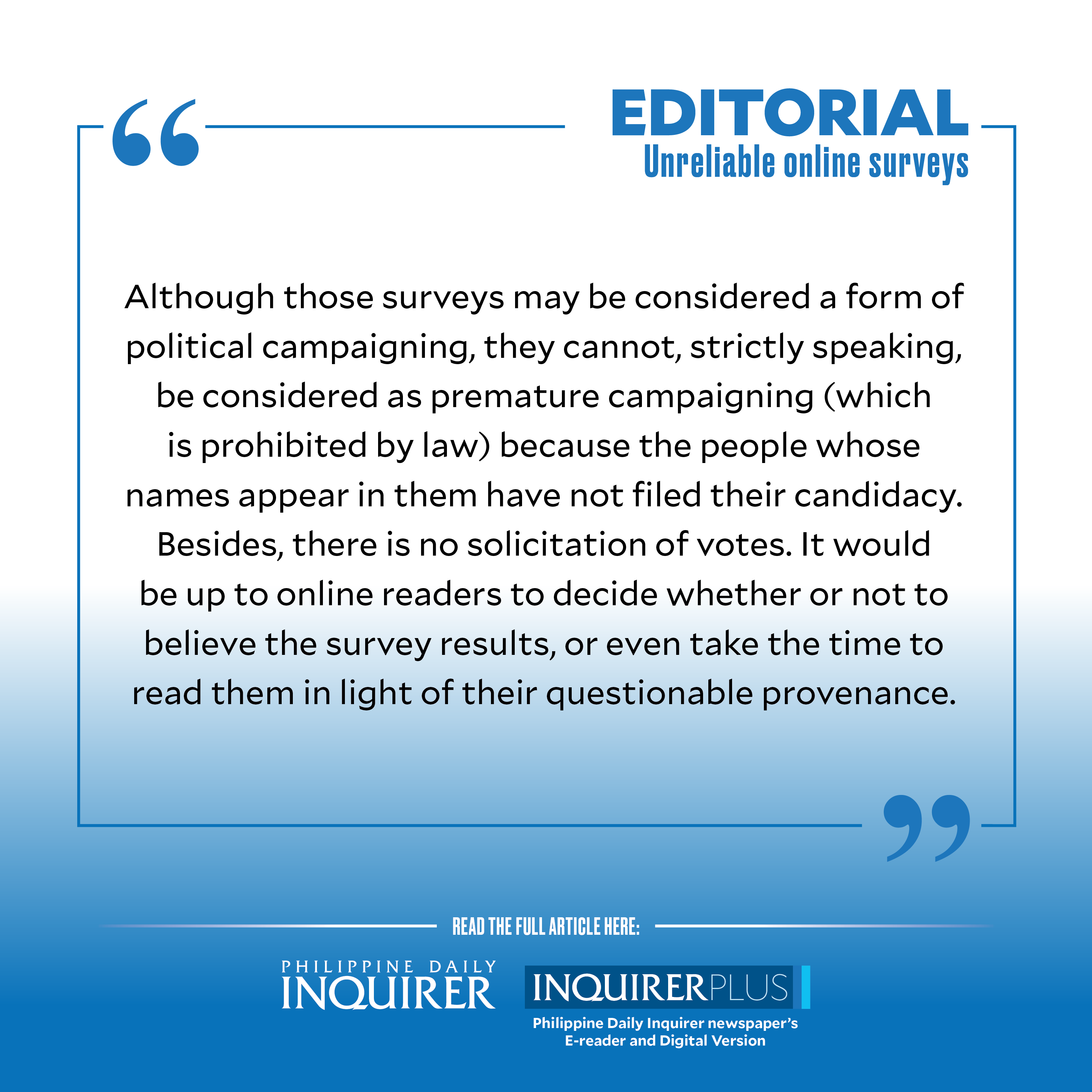Unreliable online surveys

The campaign for the midterm elections on May 12, 2025 has started on social media.
There are numerous online posts of survey reports that purport to show that some personalities supposedly enjoy wide public support for their candidacy in national and local positions in next year’s election.
The surveys were allegedly conducted by organizations whose names hardly ring a bell or whose credentials are unknown due to lack of reliable information in search engines about the people behind them.
The names of the organizations give the impression that they are affiliated with international poll companies or are engaged in noteworthy civic or social activities. Their name creators did a good job.
The proliferation of those materials had drawn the attention and concern of the University of the Philippines School of Statistics. In a recent statement, it called on the public to be critical of “kalye (street) surveys” and online polls with unclear techniques that may generate biased results.
‘Cavalier disregard’
It expressed dismay over the content creators’ “… ‘cavalier disregard’ for proper data gathering—and the publication of these suspicious surveys by public relations companies, private individuals, and media organizations despite the hazy methodologies used in the audit.”
Based on past experience, the persons whose names appear in those surveys have two objectives: first, to serve notice of their intention to run for public office or reelection without being open about it; and second, to test the political waters to see if, from the comments and “likes” that the post would get (which can be deliberately generated), they have a fighting chance for the position that they’re eyeing.
Note that making a premature declaration in public of an intention to run for an elective position could invite adverse reaction from some quarters. Worse, it may encourage other people with similar ambitions to engage in activities that can undermine the viability of the candidacy of that early bird.
‘Winning candidates’
During election campaigns, survey reports on “winning candidates” play on the erroneous idea that a vote for a candidate who has slim or zero chances of getting elected is considered wasted.
Thus, if one wants his or her vote to be counted, he or she should vote for the candidate who, based on the survey, will win or has strong chances of winning.
In other words, be part of the winning team, regardless of their candidates’ quality (or lack of it).
The covert objective of the publication of survey results is to create a bandwagon effect in favor of whoever is supposedly at the top or near the top of the survey.
Sadly, for all the efforts of the Commission on Elections and nongovernment organizations on voter education, that strategy had worked in past elections.
Issue of anonymity
The anonymity of the people behind online surveys is not surprising. If their names are disclosed and they happen to be identified with the person whose ratings in the survey are shown as exemplary, expect the survey to lose its credibility.
It may even make a laughingstock of that person and, in the process, adversely affect his or her planned candidacy.
Aside from the issue of anonymity, the problem with online surveys is the lack of credible information about their methodology or the manner by which they drafted the questions, selected the respondents, gathered their responses and evaluated them.
What criteria were observed in the preparation of the survey questions to ensure their objectivity? What rules governed the selection of the respondents in terms of age, geographical location, and economic status?
Did outside forces play a role in the collation, analysis, and evaluation of the survey results, assuming their underlying data were scientifically or competently gathered?
Questionable provenance
Since the digital space is an open field where anybody who has the gizmo or means can post any material that he or she fancies, there is nothing to prevent alleged survey results on probable winning candidates from being posted and shared.
The only challenge that the party that wants to post them has to contend with is how to make them believable or eye-catching so it can attract as many views as possible.
Although those surveys may be considered a form of political campaigning, they cannot, strictly speaking, be considered as premature campaigning (which is prohibited by law) because the people whose names appear in them have not filed their candidacy. Besides, there is no solicitation of votes.
It would be up to online readers to decide whether or not to believe the survey results, or even take the time to read them in light of their questionable provenance.
As the saying goes, caveat emptor, or let the buyers beware.
















